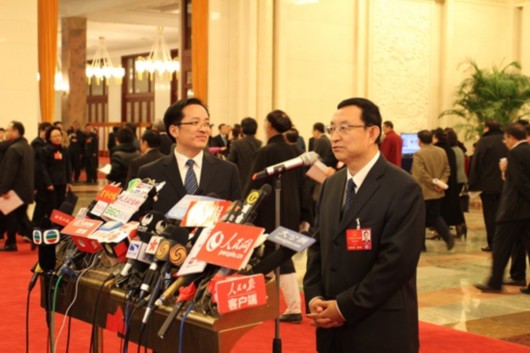 |
|
Minister of Culture Luo Shugang speaks to journalists on the red carpet in the Great Hall of the People in Beijing. [Photo/ People.cn] |
Minister of Culture Luo Shugang stressed tightening of strategy to boost the country’s cultural sectors. As Luo walked through the "minister channel", a red-carpet-covered pathway in Beijing's Great Hall of the People during the two sessions where crowds of journalists gathered to ask officials questions, he detailed some of his plans to the media. Here are his thoughts.
Produce competitive cultural products
One project, consisting of four systems, will be established during the 13th Five-Year plan to enrich people's cultural and spiritual life.
"One project" means the efforts to create high-quality cultural products, embodying the "China Dream" and advancing socialist core values. It is highly encouraged to produce more creative and diverse cultural goods to enhance the level of quality, instead of quantity, of Chinese cultural industry as a whole.
"Four systems" consists of an inheritance system that protects and advances Chinese traditional culture, a modern public cultural system, a cultural industry system, and a cultural exchange system.
We need to make our culture and traditions creatively transform, develop themselves and "become alive", which means making those values of the cultural heritage, both tangible and intangible, to live in people's heart.
The goal of cultural sector in the 13th Five-Year Plan is to make cultural industry stand out as one of the key mainstay growth. While the growth of cultural sectors takes 3.76 percent of the GDP in China, the proportion is expected to reach over 5 percent in 2020.
Poverty relief in cultural sector
To relieve poverty is one of the key focuses of the 13th Five-Year Plan and when it comes to cultural sectors, "four grasp" strategy is needed.
The first point is to "grasp" accurate planning. The Ministry of Culture has released the suggestions for poverty relief in the cultural sector for the 13th Five-Year Plan (2016-2020), which indicates that individual plans will be made for each county based on its own situation and cultural features to enable the accuracy and efficiency of the poverty-elimination work.
The second focus is to "grasp" infrastructure construction. For example, cultural centers in the villages and counties shall be constructed and improved; more library and museums on the county level are expected to be built or improved.
The third key work is to "grasp" content. The core of cultural industry is good content, so it can not be stressed enough to provide people in the poverty-stricken areas with high-quality cultural products. Those areas have their rich and deep cultural resource and it's important to make full use of it. In other words, the key is to encourage people to both create and consume culture.
The fourth point is to "grasp" talents. To cultivate cultural talents is an important task and huge effort shall be put on the cultivation of local talents. Meanwhile, volunteers in cultural sectors will be organized to work in those poverty areas. So far, there are more than 7,000 registered cultural volunteer organizations, consisting of more than a million individuals, across the country, who are highly encouraged to make their contribution to the impoverished regions. Through culture poverty alleviation, people will be able to enjoy an affluent cultural life by 2020.
|
|
|
|
|
|
|
|
